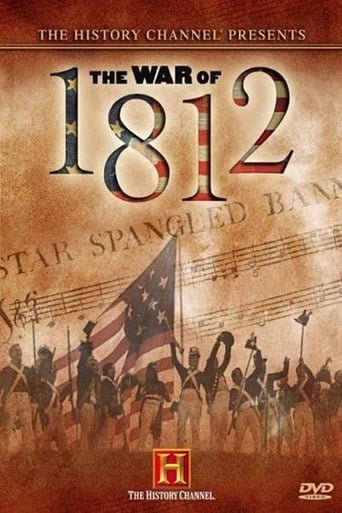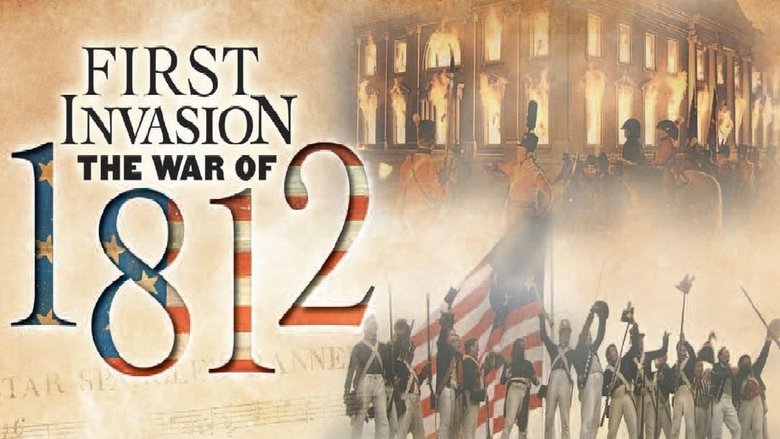
First Invasion: The War of 1812
September. 12,2004First Invasion: The War of 1812, a History Channel documentary that first aired in 2004, portrays a young United States of America "on the brink of annihilation" as it battles the largest and most powerful empire on earth. Critics say the documentary is far too pro-American, and that it ignores or downplays crucial elements of the War of 1812. Others praise First Invasion for its compelling presentation of a far too neglected period of history.
Reviews
I love this movie so much
A lot of perfectly good film show their cards early, establish a unique premise and let the audience explore a topic at a leisurely pace, without much in terms of surprise. this film is not one of those films.
Although I seem to have had higher expectations than I thought, the movie is super entertaining.
It is an exhilarating, distressing, funny and profound film, with one of the more memorable film scores in years,
I watched this documentary precisely because of the negative reviews written by the ignorant Canadians on this site. When I read their commentaries, I knew that this documentary would be a valid, compelling, and above all, factual account of the War of 1812. Why? Have you ever heard the idiom, "The truth hurts?" I'd surmise that for the Canadians that watched this documentary, it was the very first time that they came in contact with the facts relating to the War of 1812.Canadian mythos and historical fact are diametrically opposed to one another. During a Canadian child's formative years, he or she mustn't learn that Canada is a feckless, irrelevant, parasitic, kvetching, British colony. To learn this truth would cause unrest in the minds of Canadian society. Who would want to learn that the land they live in is a gross underachiever and a cowardly fence sitter? Nobody would. So the social engineers within Canada have constructed an alternative history that is disseminated to the masses. Agitprops, like the CBC and other media and entertainment outlets, must conform to Canadian content (CanCon) laws. These laws facilitate and encourage purposefully deceitful content to reach the minds of Canadians.What is this alternative history? In a nutshell, anything that would suppress the troublesome truths about Canada. Counterfactual history and historical revisionism related to the War of 1812 is just one of many topics that gets CanCon treatment.The War of 1812 occurred nearly 60 years BEFORE Canada was confederated. Canada was not a belligerent nation during the conflict. The nations that warred with one another were the United States of America and Great Britain. The local populace living in what is now known as Canada were British subjects. Any Canadian militia that fought during the War of 1812 had done so under the Union Jack flag and under British leadership.But what about these local "Canadians?" What was their contribution during the war? Simply put, they had surrendered to the Americans in 1813 during the Battle of York. York had been the capital of the province known as Upper Canada. During that battle, American soldiers had ransacked and burned down Parliament and the Governor's house. Private homes had also been pillaged. After the town razing, the Canadian, colonial government surrendered to the Americans. Canadian militia had surrendered to the Americans, practically without firing a defensive shot. For more information on Canada's specious militia history, google "the Militia Myth." In order to create and bolster Canadian self-esteem, Canadians are taught that Canada did not suffer abysmally during the war, as history informs us. They are even taught to, absurdly, take credit for British victories during the conflict.The United States of America met all of their stated goals during the War of 1812. Great Britain stopped impressing Americans into the British Navy, Great Britain agreed to stop the trade restrictions they had tried to place on America and Great Britain stopped its support of American Indians. For these reasons, the War of 1812 was fought and won by the Americans.This documentary accurately describes this monumental American achievement with clarity. I highly recommend that you watch it. If you're a typical Canadian suffering from Canada's main malady (inferiority complexity), you may squirm in your seat as you watch this documentary. You'll likely get upset at hearing the truth and decide to write a negative review on IMDb. It's the only therapy you'll have because at the end of the day, you still live in a feckless, irrelevant, parasitic, kvetching, British colony.
I find the Canadian reviews far more interesting than the documentary. Its interesting that all Canadian reviews find it inaccurate and the rest including this one are responding to their comments. I work with many Canadians (French and English) and didn't realize that the War of 1812 is viewed by Canadians the way Americans view the American Revolutionary War.At the time of the War of 1812 current Canada was British North America, part of the British Empire. The Dominion of Canada did not become a nation until 1867 (as a result of the U.S. Civil War) and even to this day retains the British Crown. The War of 1812 was between the United States and British Empire. British North America at the time offered a convenient (if unsuccessful) point to attack the British Empire. U.S. expansionism was a motivation but as you all point out invasions to the north were very unsuccessful and not well manned or prepared. Regardless the U.S. attempted to invaded a British territory, not another country. I am unaware of any U.S. military invasion of Canada since 1867 and in fact the two countries share the longest unguarded border in the world.I want to respond to the points raised by jcp-9.1) After American independence Britain didn't recognize naturalized American citizenship, and treated anyone born a British subject as still "British" — as a result, the Royal Navy impressed over 9,000 sailors who claimed to be American citizens. Impressment was not abolished by the British until 1814. Impressment of a nation's citizens by another nation is an act of war. 2) British forces certainly invaded Chesapeake Bay and New Orleans. They were not invited. Yes the U.S. did declare war on the British Empire and this was in response to impressment as well as other grievances. 3) The United States was fighting the British Empire. The U.S. at the time was clearly the underdog. Again at the time Canada did not exist as a nation but as British North America. 4) Regarding the Battle of New Orleans, if the war was over why were the British invading? Communications were slow and neither side was aware of the Treaty of Ghent.Another point from Erik Kaufman, "Condemned to Rootlessness: The Loyalist Origins of Canada's Identity Crisis", Nationalism and Ethnic Politics: "Already, the War was being turned to mythical ends in Upper Canada: Britain had defended her colonies and Providence had ensured the 'Triumph of virtue over vice, of a good cause over a bad one...Together, Upper Canadians came to believe, they had vanquished the forces of tyranny and oppression. Out of the war there arose a sense of community, an awareness of being Upper Canadian, which encompassed all settlers. The War of 1812 came to be considered by many as the colony's rite of passage into young adulthood.'"
I enjoyed this docudrama. I am now 80 and went to universities for my degrees back in the 1940/50 era. At that time we had more class coverage in history of the early days of the US. I do remember the War of 1812 being covered, but not as much as given in this presentation. Now as I read the comments of the Canadian, it is apparent that his emotions are getting the best of his judgment and feelings for understanding the realities. Of note is the attrition of the forces in the line charging and slaughter of the front rows as they advance. Modern armies would never do that sort of charging, at least not since the British tried charging the German lines that way, almost, in the Great War (known today as World War I). Historical events are now past, emotions for the most part are healed. Taking sides to belittle any part in the events past is ridiculous and will never change what happened.
I have read the reviews and as a Canadian I beg to differ in regard to this documentary. No wonder it was never shown in Canada. What do the film makers mean America won the War of 1812 ? You never conquered my country.Consider these facts. In February, 1815 our British forces controlled the District of Maine; Prairie Du Chein in Wisconsin, ( This fort controlled the fur trade on the upper Mississippi and access to the Great Lakes. ), Fort St. Mary along with the town and Cumberland Island, Georgia and Fort Bowyer, Alabama.And how much territory in Canada did American forces control in February, 1815 ? Oh yeah. None.In addition to this the British were effectively blockading all eastern and southern American ports and six American states were considering succession from the Union. ( Hartford Convention. ) Now I want to set the record straight regarding the Battle of Baltimore. You did not give us a Stalingrad ! A small diversionary force of 4,000 British soldiers and sailors took on 12,000 American soldiers who stayed behind their walls of Fort McHenry and in the city while the rockets from the British ships tried to knock the well built walls of the fort down. After 25 hours the British stopped their bombardment and slowly withdrew. The Americans did not pursue us. The British left well satisfied because they knew they had greatly exceeded their original mission which was to take Washington D.C. We had also taken Fort Washington; Alexandria, Virginia; won two battles - Bladenburg and North Point and perhaps best of all, liberated approx. 2,000 black slaves in the Chesapeake area and took them away with us to start new lives as free people in Canada, Bermuda and Trinidad. We also liberated approx. 1,500 more slaves on Cumberland Island, Georgia and more were set free elsewhere. Why didn't the documentary tell the American viewers about all this ? As the Treaty of Ghent, Belgium makes clear, the War of 1812 ended in a draw but the British were clearly winning it.It would be wrong to call the war, America's Second War of Independence as we only intended to take the Territory of Michigan from you to give to Britain's Indian allies as their own permanent land.Finally, what should have been covered by this documentary were all the tens of thousands of American P.O.W's that were imprisoned at Melville Island, Halifax, Nova Scotia, at Dartmoor Prison in England and elsewhere. Believe me, their story needs to be told.
Top Streaming Movies













